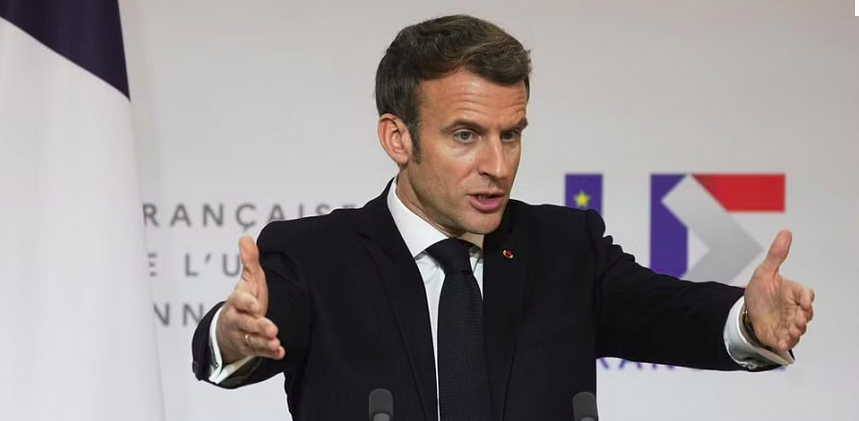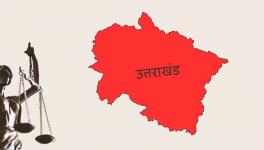Macron Wins ‘Without Triumph’ as Far-Right Entrenches Itself in France

Image Courtesy: AP
Bien accueillir, extrème droite. La France est divisée (Welcome Extreme Right, France is Divided)— yes, France has welcomed the Far-Right and is polarised. Emmanuel Macron might have scripted history by becoming the first French president to be re-elected consecutively but Sunday’s momentous victory also showed the ominous entrenchment of the Far-Right in France’s national politics.
Riven by the vitriol unleashed by Rassemblement National (National Rally, known as National Front till 2018) founder Marion Anne Perrine ‘Marine’ Le Pen and Eric Zemmour-led Reconquête! against Muslims, immigrants, the European Union (EU) and globalisation, the multiculturalism of France has been dealt a devastating blow.
The election results portend the ominous surge of the Far-Right. Macron defeated Le Pen in the second round by winning 58.55% of the votes against 41.45% for her but by a reduced margin compared with their 66.1% to 33.9% fight in 2017.
France might have voted to keep the Far-Right out of the Élysée this election but Le Pen added almost three million votes to her 2017 tally, indicating how the Far-Right is menacingly catching up since World War II. In all, 26 districts and two overseas territories voted for her, and Macron’s winning margin in every district, except New Caledonia, reduced.
Declaring victory in front of the Eiffel Tower, Macron too acknowledged that “our country is beset by doubts and divisions” and the French voted not for his ideas “but to block those of the Far-Right”. French dailies were quick to pick on the brutal reality: Le Monde dubbed his win “An evening of victory without a triumph” and Le Figaro asked: “Who can possibly believe that it is rooted in popular support?”
Macron’s rival was unrelenting. Le Penn was at her usual combative best declaring the loss a “brilliant victory”. Her words showed how breaching the 40% votes mark—a gigantic improvement over her late father and National Front founder Jean Louis Marie Le Pen’s rout by Jacques Chirac by 82% to 18% in 2002—has catalysed the party and cemented its nationalist and xenophobic agenda.
“The ideas we represent have reached new heights... this result itself represents a brilliant victory. In this defeat, I can’t help but feel a form of hope,” Le Pen told her supporters at an election night party. “This evening, we launch the great battle for the legislative elections (scheduled for June).”
In fact, the first round highlighted how the radical right had fortified itself with Macron winning only 27.8% of the vote compared with Le Pen’s 23.2%. The results also ended the decades-old traditional dominance of the Centre-Left Parti Socialiste and the Centre-Right Les Republicains with the combined vote share of the Far-Right crossing 30%.
Le Pen also reaped the harvest of Far-Left candidate Jean-Luc Mélenchon finishing third in the first round—though with a wafer-thin margin of 1.2%—and the historically low voter turnout. Mélenchon might have finished a close third but he wiped out other contenders, including the Les Républicains, by improving his tally from 19.6% in 2017 to 22% in 2022.
Le Pen’s Far-Right ideology helped her beat Mélenchon due to their overlapping agendas of opposing the rising cost of living, Macron’s economic liberalism, increasing globalisation, the European Union and the North Atlantic Treaty Organisation or NATO. Le Pen’s Far-Right stance added ballast to her claim of being the best candidate to lead France after she combined it with the Far-Left’s agenda.
Usually, supporters of candidates edged out in the first round don’t vote in the second round—they either don’t agree with the agendas of the final two candidates or are frustrated and unsure. This explains the historically low voter turnout in the final round this year.
The abstention rate reached a record 28%, or 13,600,000 voters, 2.5% more than in 2017 and the highest since 1969. In fact, according to an Ifop poll conducted after the first round, 44% of Mélenchon supporters were expected not to vote in the second round. A recent Ipsos poll showed half of Mélenchon’s supporters would neither vote for Macron nor Le Pen. Even in the first round, around 26% of voters didn’t vote, 4% lower than in 2017.
Alarmingly, around 6.35% of votes cast in the final round were ‘blank’ and another 2.25% ‘null’ (when a candidate’s name is either crossed out or a ballot is invalidated). According to Ipsos and data analysis firm Sopra Steria, 41% of voters in the 18-24 age group did not vote. According to Le Monde, if blank votes were recognised, Macron would have been elected with 54.7%, not 58.5%, of the votes cast.
Since her father’s first presidential contest in 1997, an increasing number of French have rooted for Le Pen’s party. Changing her campaign tactics and concentrating more on the decreasing purchasing power of the ordinary man, jobs and “social inequalities” and batting for the working class, Le Pen’s had solidified her support base before the election—without abandoning her hard-core agenda against immigrants, Islam and the EU and her pro-Russia stance.
Education has become a determinant in the rising support for the Far-Right. Unlike the 1950s and the 60s, lower-educated voters, especially in rural France, have been gradually aligning with Right-wing parties, which have been feeding on their fears of immigrants taking up jobs and finally subsuming them and the government ignoring their plight.
The National Rally’s vote share from the least-educated city to the most-educated ones increased from 4 percentage points in 1995 to 24 in 2022 with municipalities having a lower share of university graduates becoming increasingly likely to vote for Pen, according to political surveys. Similarly, the share of primary-educated voters supporting Le Pen jumped from 10% to 34% between 1986 and 2017.
Even in poorer cities, which have lower levels of education, the support for Le Pen has increased. Compared with 1995, the support for National Rally increased by 22 percentage points in 2022 moving from the smallest to the biggest city.
In rural areas, Le Pen garnered more support from the working class, especially Whites—who felt cheated by Macron as factories shut down or shifted overseas—by capitalising on their anger and a sense of abandonment. For example, in Beaucamps-le-Vieux, which was once an industrial hub north of Paris, she won double the number of votes bagged by Macron and four times as many as Far-Left candidate Jean-Luc Mélenchon in the first round. Shockingly, some voters had shifted from the far-left to the far-right.
What makes Le Pen’s inroads more dangerous is the lethal concoction of her polarising agenda and the apparent support for the working class. While Zemmour continued his diabolical tirade against Muslims and immigration during the campaign, Le Pen promised to slash sales tax on oil, gas and electricity, scrap income tax for several young French workers and raise the minimum wage by 10%.
Le Pen also promised to give jobs, housing and welfare preferences to French, almost halt immigration and ban the Muslim headscarf in public and Halal meat—not diverting from her divisive goal but shrewdly couching it under such promises as Zemmour literally played into her hands by advancing her chasmic agenda.
The meteoric rise of Far-Right polemicist and former journalist Zemmour, who has compared Islam with Nazism, in the last few years to become a presidential contender shows how several voters are gravitating to radicalism.
Convicted repeatedly of hate speech and incendiary remarks, Zemmour went to trial in November 2021 for inciting racial hatred when he said in November 2021 that unaccompanied foreign minors were “thieves, murderers and rapists” and should be sent back.
Despite garnering only 7% of the votes and ranking fourth in the first round, Zemmour was initially considered a threat to even Le Pen in the opinion polls and the primary candidate that could challenge Macron. Even Le Pen’s niece Marion Marechal believes in Zemmour’s potential and joined him in March with the Reconquête! founder describing it as the “great union of the Right”.
What’s more dangerous is Zemmour’s support in the richest cities unlike Le Pen’s. There is a high probability that he was backed by the elite section that used to vote for the more rabid Jean Louis Marie and has been disenchanted by Le Pen’s changed and moderate rhetoric. Zemmour has also benefited from his extensive media experience and limelight. He appeared on the cover of the conservative magazine Valeurs Actuelles five times in the first nine months of 2021 and was mentioned 4,167 times—139 times a day—in French media outlets, according to media observatory Acrimed.
The general notion that the French Far-Right was only a peripheral threat has been blown to pieces gradually with the National Rally having seats at local and regional levels, in the Senate and European Parliament and a growing support in the military.
In fact, aware of the rising anti-Islam sentiments in the country, even Macron’s party has taken a hard stance on Muslims. During a debate with Le Pen in February 2021, interior minister Gerald Darmanin, who had prohibited the construction of a mosque in Strasbourg, blasted her for “not being tough enough” on Islam.
The rise of the Far-Right has also been aided by a divided France. A March 2017 survey by Bertelsmann Foundation a few days before the presidential election showed that French voters were among the most polarised in the EU.
One in five described themselves as “extreme” and only about a third as “centrist”. The survey, based on the responses of 11,021 people across the EU, showed that 20% of French voters saw themselves as either extreme Right or extreme left compared with just 7% in the wider EU—out of those, 14% of French described themselves as extreme Right with only 36% considering themselves as centrist compared with 62% in the wider EU.
Get the latest reports & analysis with people's perspective on Protests, movements & deep analytical videos, discussions of the current affairs in your Telegram app. Subscribe to NewsClick's Telegram channel & get Real-Time updates on stories, as they get published on our website.
























